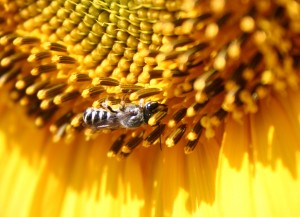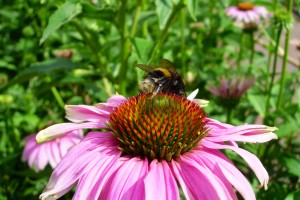
Bees and food production
Understand what is the role that pollinators in agriculture and we should preserve it
 Despite having contact with apiaries since the age of seven, it was only in 2007 the advertising Malusa Daniel Gonçalves became aware of the decline in the bee population in many countries. "The universe of bees always been present in my life. I come from a family of beekeepers. But, It was first, an International Congress in France, I heard about the problem in a completely scientific environment and what caught my attention, because in Brazil nothing was being done about it ", account Gonçalves.
Despite having contact with apiaries since the age of seven, it was only in 2007 the advertising Malusa Daniel Gonçalves became aware of the decline in the bee population in many countries. "The universe of bees always been present in my life. I come from a family of beekeepers. But, It was first, an International Congress in France, I heard about the problem in a completely scientific environment and what caught my attention, because in Brazil nothing was being done about it ", account Gonçalves.
Some years, in 2012, participation in the Cannes Festival, the publicist noted that many papers presented at the event had the purpose of empowering socially conscious campaigns. And from there, He decided to use his experience as advertising to draw attention to the problem and create a campaign of awareness and protection of bees in Latin America. Through non-governmental organization Bee or not to be, It was launched in 2013 the campaign "No Bee, No Food ".
"Our goal is to make society aware of the importance of bees, and alert them to the risks of decline of these pollinators ", says Gonçalves. "In August of that year, the IBOPE Intelligence conducted a survey which found that 78% of the population is unaware of or have never heard pollination ", reports. "What this research shows is that most do not know that the main ecosystem service of bees is pollination. People only associate bee honey and chopped, what a great disinformation. More than 3000 species do not bite ", full.
Actions
 Since the Campaign was created, some actions have been carried out. A public petition delivered to IBAMA, Ministry of Agriculture, Livestock and Supply, Ministry of Environment and leaders from among beekeeping, It calls for steps to be taken for the preservation of bees. Among the problems highlighted in the petition that cause the decline of these pollinators are - the indiscriminate use of pesticides (aerial spraying and also); the degradation of green areas and climate issues. "These are the main", says Gonçalves.
Since the Campaign was created, some actions have been carried out. A public petition delivered to IBAMA, Ministry of Agriculture, Livestock and Supply, Ministry of Environment and leaders from among beekeeping, It calls for steps to be taken for the preservation of bees. Among the problems highlighted in the petition that cause the decline of these pollinators are - the indiscriminate use of pesticides (aerial spraying and also); the degradation of green areas and climate issues. "These are the main", says Gonçalves.
Another line crafted by "Without Bee, No Food "is the environmental education. "We have developed a material - an environmental education notebook and also a video - directed the age of teachers and students 8 a 11 years. It is a pedagogical nature of material dealing with the issue of environmental education from the perspective of bees ", explains the advertising.
The campaign also launched in 2014 the application Bee Alert. The tool, free, It is directed to beekeepers, beekeepers and the scientific community, that can record and document this platform the disappearance of occurrences or death of bees all over the world, indicando local, intensity and possible causes. "The application idea is to contribute to the study of the problem and seek the causes".
For those in the city, a Bee or not to be suggests a number of activities for those who want to help in this work of preservation of bees as, for example, "Consume organic products"; "Plant trees and cultivate flowers"; "Sobre question or problem", among others.
Pollination and food production
 Pollination is the process that ensures the production of fruits and seeds and breeding of various plants. Among the pollinators are bees, wasps, butterflies, birds, bats, and other animals, which are responsible for the transfer of pollen grains from the male flowers to female flowers of the receivers.
Pollination is the process that ensures the production of fruits and seeds and breeding of various plants. Among the pollinators are bees, wasps, butterflies, birds, bats, and other animals, which are responsible for the transfer of pollen grains from the male flowers to female flowers of the receivers.
Bees, However, develop a key role, as 70% agricultural crops and 85% all existing flora in nature depend on pollinators. "It is very important that farmers also turns his sights for it, because the loss of bees will also hurt seriously their activity ", alert Gonçalves.
Launch
As part of the shares of "No Bee, No Food ", It will be launched in 11/12 Campaign "Friendly City of Bees", on France, Inside S. Paulo. In this ocasion, It will open the largest meliponary of Brazil.
In order to suggest to municipalities public management actions for the preservation of bees, Campaign recommends, for example, honey in school lunches, swarms of rescue practices in the city, Cutting guidelines and cutting trees that have swarm of bees, stimulating the realization of organic fairs and gardens, among other actions.
Read too - The disappearance of bees Syndrome
For more information about the campaign "No Bee, Without food ", access www.semabelhasemalimento.com.br
Source: http://cenarioagro.com.br/as-abelhas-e-a-producao-de-alimentos/

Sorry, the comment form is closed at this time.